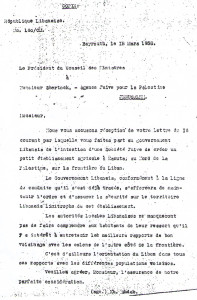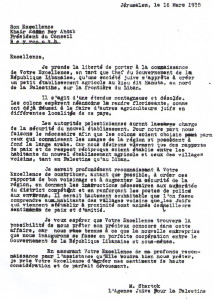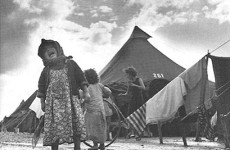Exchanging Letters with the Lebanese Prime-Minister
Kibbutz Hanita was founded in 1938 on a land purchased by David Ben-Gurion, then head of the Jewish Agency For Palestine. IsraCast presents the original letter sent by Moshe Shertok of the Jewish Agency to the Lebanese Prime Minister Al-Adhab and his reply letter.

Hanita was an ancient Jewish settlement, situated in the land belonging to the tribe of Asher. The name is mentioned in the Talmud, in the 2nd – 3rd century, in the description of the Jewish settlements on the northern border. The source of the name is “Hanaya”, an encampment, a place of rest for travellers going between the plains of Lebanon and the ports of Achziv and Acre.
In those days, The purpose of the settlements was to guard the passes from the mountains to the fertile valley below.
In the 1930s, with the increase in settlements, the Arabs demanded that the British stop Jewish settlement. When they perceived that their demands were not being met, they turned to violence. The Jewish Agency set up a series of ‘overnight towns’ relying on an un-revoked Ottoman Law allowing any building to remain intact once a roof has been placed on it. The settlers prefabricated the walls and roof of the new kibbutz’s dining hall. Its double wooden walls were filled with gravel for protection against Arab snipers, and a prefabricated wooden watchtower was likewise at hand. During the course of the Tower and stockade campaign, 52 new Jewish settlements were established throughout the country.
Against protests from his cabinet, David Ben-Gurion decided to purchase 5,000 dunam of hilly non-arable land. A group was chosen to settle the land, to ascend to a point one kilometer from the road and to erect a base camp, and to prepare food, water, ammunition, clothing and tools ahead of time, in case of need. On the morning of 21 March 1938, fifty trucks carrying 500 people arrived to break a trail, and to carry all the provisions made ready to lower Hanita. With 100 men remaining at the camp, an Arab gang attacked, killing two men. The following day help arrived and work continued. On the fifth day, the road was completed to lower Hanita. After six months, there was a change of personnel. The ‘Shimron’ group took over responsibility of establishing the agricultural community on the mountain. They were joined some time later by the ‘Segev’ group.
In November 1947, the United Nations Partition Plan for Palestine gave the Western Galilee, with its seven Jewish settlements, to the Arab state. When war was declared, Hanita was isolated from the Jewish section, and several battles were waged in the area, so the kibbutz members evacuated the children from Hanita to Haifa. On the day of Israel’s declaration of independence, the Jewish army broke through, and the Western Galilee became part of the new state. The kibbutz came to demarcate Israel’s border with Lebanon in the Western Galilee.


Jerusalem, March 16, 1938
Your Excellency
Khayr al-Din al-Adhab
President of the Council
Beirut

I am taking the liberty of notifying Your Excellency, as the head of the Lebanese Republic, that a Jewish community is preparing to establish a small agricultural settlement in the place known as Hanuta, in northern Palestine, on the Lebanese border.
The tract of land in question is mountainous and desolate. The settlers nevertheless wish to turn it into thriving land, such as other Jewish farmers have already succeeded in doing in different regions of this country.
The Palestinian authorities will be responsible for the security of the new settlement. On our part, we will do what is necessary to ensure that the settlers who are chosen are familiar with the customs of the region and fluent in the Arabic language, for we are very interested in establishing relations of mutual peace and respect between the inhabitants of the new agricultural settlement and the neighboring villages, both in Palestine and in Lebanon.
I would be deeply grateful would Your Excellency contribute, insofar as possible, to creating these neighborly relations, increasing security in the region by giving the necessary instructions to the authorities of the appropriate district and reinforcing the police stations in the surrounding area. It would be highly desirable to make the inhabitants of these villages understand that the Jewish people who are coming to settle in the vicinity do so with the best sentiments of peace and friendship.
I hope that Your Excellency will find the opportunity to lend us his precious support in this matter for we wish to proceed with this new initiative we are launching in perfect cooperation between the Government of the Lebanese Republic and ourselves.
I assure Your Excellency that I shall be profoundly grateful for the assistance. Please accept, Your Excellency, assurances of my highest consideration and dedication.
M. Shertok
Jewish Agency for Palestine
Beirut, March 18, 1936
President of the Council of Ministers
to
Mr. Shertok – Jewish Agency for Palestine
Sir,
We are acknowledging receipt of your letter dated the 16 of this month, by which you notify the Lebanese government of the intention of a Jewish community to create a small agricultural settlement in Hanuta; in northern Palestine, on the Lebanese border.
The Lebanese government, in accordance with the course of conduct which has already been outlined, will strive to maintain order and ensure security on the Lebanese territory adjoining this settlement.
The local Lebanese authorities will not fail to make the inhabitants in their jurisdiction understand the interest in fostering the best neighborly relations with the settlers on the other side of the border.
Incidentally, this is Lebanon’s position in all of its relations with the different neighboring populations.
Please accept, Sir, the assurances of my highest consideration and dedication.
(sgd.) Kh. Ahdab




